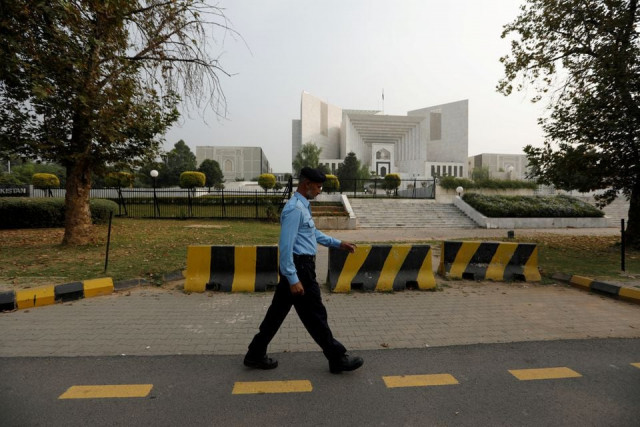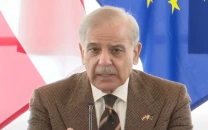Vawda’s judgment shows inconsistency in SC verdicts
Ex-PTI MNA not disqualified for life unlike many other lawmakers

The Supreme Court is continuing to be inconsistent on the applicability of Articles 62 and 63 of the Constitution as was witnessed in ex-PTI MNA Faisal Vawda's case wherein the judges showed magnanimity and avoided to disqualify him for life in view of its larger bench's order in the 2018 Habib Akram case.
Both the constitutional provisions — 62 and 63 — define the eligibility as well as disqualification of lawmakers.
However, the written order is yet to be issued in Vawda's case wherein he was simply de-seated under Article 63(1)(c) of the Constitution on account of holding dual nationality at the time of filing his nomination papers for the 2018 general elections.
Since the restoration of the judiciary in March 2009, dozens of lawmakers were disqualified on several charges like concealment of assets, dual nationality, fake degrees, etc.
However, it is being witnessed that the SC's jurisprudence is inconsistent when it comes to the lawmakers' eligibility or lack of it.
During the tenure of ex-chief justices Iftikhar Chaudhry and Saqib Nisar, the apex court strictly applied both the provisions and ousted several elected representatives without recording evidence.
Now, there is a realisation that the SC judges are avoiding to follow the top court’s jurisprudence related to both constitutional provisions wherein the principle of strict liability was applied.
Even during the hearing of Vawda’s case, Chief Justice of Pakistan Umar Ata Bandial had observed that Article 62(1)(f), which held the ultimate punishment of lifetime disqualification of lawmakers, was a “draconian” constitutional provision.
CJP Bandial passed these remarks despite being the judge, who had written the 2018 judgment wherein it was justified that disqualification under Article 62(1)(f) would be for life.
Interestingly, the Constitution is silent about the duration of disqualification under Article 62(1)(f).
Later, the SC held that no one could be disqualified under Article 62(1)(f) without a trial.
However, the court has maintained that the superior judiciary could apply the same provision on the basis of admitted facts by exercising quo warranto jurisdiction.
Habib Akram case
In June 2018, a five-judge larger bench of the apex court, led by then CJP Saqib Nisar, had directed all candidates of the July 25, 2018 general elections to attach approved affidavits along with their applications.
The directives came after the court practically restored almost all information omitted in the nomination forms approved by parliament in the previous year.
These affidavits included declarations by the candidate about not defaulting on a bank loan or utility charges, details about candidate’s spouse(s) and dependents and their businesses, details of any criminal charges, education credentials, taxes paid in the last three years, contribution to community’s welfare, donations to the party or sums received from the party and net assets with annual increase or decrease in them.
The order noted that if the affidavit or any part thereof was found to be false, then it would have consequences, as contemplated by the Constitution and the law.
“Since the affidavit is required to be filed in pursuance of the orders of this court, therefore, if any false statement is made therein, it would also entail such a penalty as is of filing a false affidavit before this court,” it read.
The Election Commission of Pakistan (ECP) had disqualified Vawda under Article 62(1)(f) on the basis of the above-mentioned Habib Akram judgment.
Later, the apex court disqualified two lawmakers in the cases of Nida Khoro and Sher Baz Khan Gaadhi on the basis of that verdict.
However, the SC did not apply this ruling in Vawda's case and disqualified him under Article 63(1)(c) wherein he was simply de-seated.
Under this provision, there is no bar on Vawda to contest future elections.
Senior lawyers appreciate that the SC is showing magnanimity and avoiding disqualifying lawmakers for life.
However, they say that the SC should have overturned the Habib Akram judgment before applying Article 63(1)(c) to Vawda’s case.
The lawyers are also wondering how the SC can ask him to give an undertaking to tender his resignation as a senator.
There is no precedent of seeking such an undertaking.
The SC is a court of law and not that of morality.
Former Supreme Court Bar Association (SCBA) president Ahsan Bhoon in his speech at a full court reference had referred seven questions of law referred by Justice Qazi Faez Isa in the Sheikh Rashid case to resolve the ambiguity regarding the applicability of both constitutional provisions.
Article 225 of the Constitution says that no election of a lawmaker shall be called into question except by a petition before a polls tribunal.
However, the superior courts overlooked this constitutional provision and disqualified dozens of lawmakers by exercising quo warranto jurisdiction.


















COMMENTS
Comments are moderated and generally will be posted if they are on-topic and not abusive.
For more information, please see our Comments FAQ